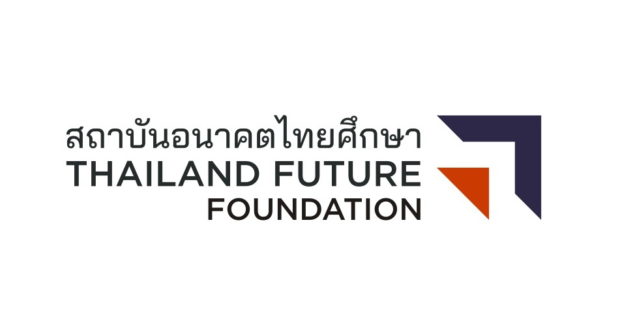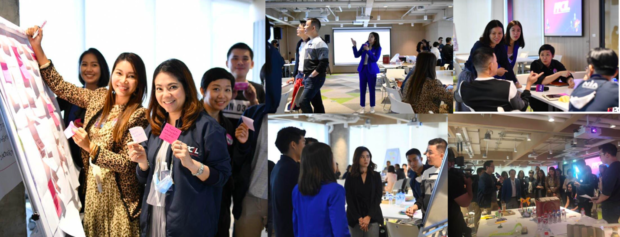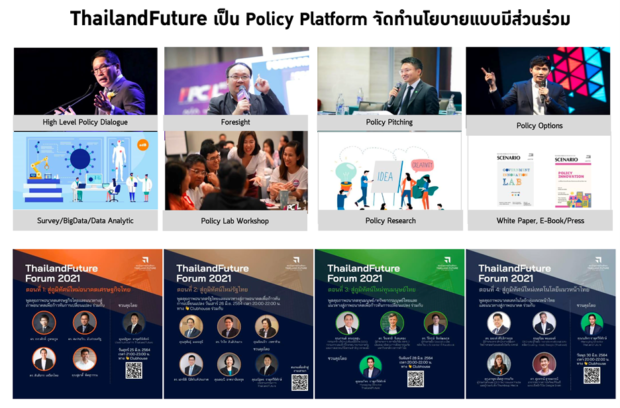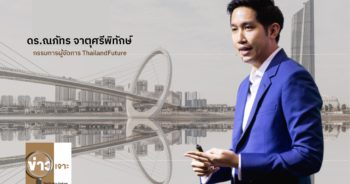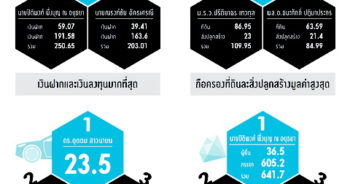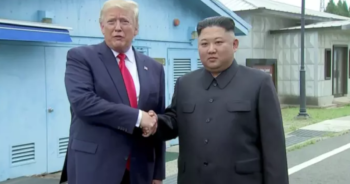สถาบันอนาคตไทยศึกษาเปลี่ยนผ่านสู่ “ThailandFuture” ที่เป็นทั้ง “ตัวเร่ง” และ “ตัวรวม” ดันแพลตฟอร์มนโยบายรูปแบบใหม่ เปลี่ยนกระบวนการคิดวิธีทำนโยบายจากปิดสู่เปิดกว้างที่จับต้องได้ ผนึกเครือข่ายร่วม Rebuilding Thailand
สถาบันอนาคตไทยศึกษาเปลี่นผ่านสู่ ‘ThailandFuture’ สานต่อความสำเร็จการเป็นสถาบันคลังสมองที่วิเคราะห์อนาคตไทยมาตั้งแต่พ.ศ. 2555 สู่การเป็น “ตัวเร่ง” และ “ตัวรวม” (Catalyst & Aggregator) ทรัพยากร ข้อมูล และทางออกนโยบาย จากเหล่าผู้พิทักษ์อนาคตไทย ทุกเพศทุกวัย จากทุกสาขาอาชีพ ทุกขั้วความคิด ผ่าน “ThailandFuture Policy Platform” แพลตฟอร์มนโยบายตัวกลางที่เป็นพื้นที่เชื่อมต่อหลักฐานเชิงข้อมูลและความคิดเห็นจากผู้รับนโยบาย นักวิชาการและผู้มีส่วนได้ส่วนเสียเข้ากับหน่วยงานภาครัฐที่มีหน้าที่ออกแบบและขับเคลื่อนนโยบาย เพื่อผลักดันให้เกิดกระบวนการ “ร่วมคิด-ร่วมทำ” นโยบายรูปแบบใหม่ ที่เปิดกว้าง กระจายอำนาจ และอิงวิทยาศาสตร์มากขึ้น สู่อนาคตไทยที่สดใสกว่า
ดร. ณภัทร จาตุศรีพิทักษ์ กรรมการผู้จัดการ ThailandFuture กล่าวว่า ปัจจุบันประเทศไทยกำลังเผชิญกับ ‘ไฟแห่งปัญหา’ รอบทิศทางทั้งไฟปัญหาเก่าที่รุมเร้า ท่ามกลางเสาหลักเศรษฐกิจและสังคมที่กำลังผุพัง ทำให้การเติบโตชะลอลง ซ้ำเติมปัญหาความเหลื่อมล้ำ ไฟปัญหาใหม่ที่กำลังปะทุจากวิกฤติการแพร่ระบาดของโรคโควิด-19 รวมถึงยังมีความท้าทายที่รอวันลุกไหม้จากเทรนด์คุกคามอีกมากมาย เช่น ความไม่พร้อมต่อการไปสู่สังคมสูงวัย การมาของ automation การผงาดขึ้นของจีน และภาวะโลกร้อน
ดร. ณภัทรย้ำว่า “ปัญหาที่แท้จริง ไม่ใช่ว่าประเทศไทยมีทรัพยากรไม่เพียงพอต่อการพัฒนาประเทศชาติ เรามีคนที่มีความสามารถ มีทุน เพียงแค่มันอยู่ไม่ถูกที่ถูกเวลา อยู่ภายใต้ระบบการทำงานที่ขาดประสิทธิภาพ ความชัดเจน และเต็มไปด้วยความสับสน และมันก็ได้กำเริบออกมาให้เห็นในการพลาดท่าต่อสายพันธุ์เดลต้า แต่หากลองถอยออกมา จะพบว่าต้นตอของปัญหาทั้งหมดทั้งปวงสามารถถูกยุบลงมาให้เห็นได้กระจ่างว่ามันล้วนเกิดมาจากการขาดหลักการและประสิทธิภาพในการจัดสรรและบริหารทรัพยากรเหล่านี้ให้เกิดประโยชน์สูงสุดต่อสังคม”
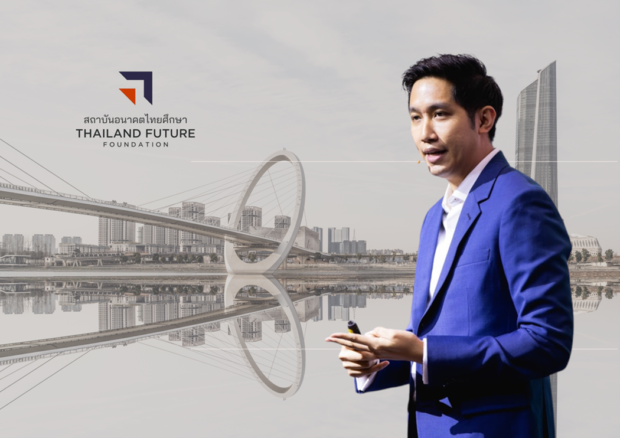
ดร. ณภัทร เสนอแนวคิด “ไตรลักษณ์นโยบายอนาคต” ที่ ThailandFuture นำมาประยุกต์ใช้เพื่อให้รู้เท่าทันโลกยุค VUCA และช่วยพาไทยรอดพ้นวิกฤติ
กระบวนการคิดการทำนโยบายต้องเปิดกว้างและเชื่อมต่อกับโลกภายนอกมากขึ้น เป็นการ “ปลดล็อก” ห้องออกแบบนโยบายแล้วเชื่อมต่อมันเข้ากับประชาชน ท้องถิ่น และผู้มีส่วนได้ส่วนเสียตลอดทุกข้อต่อของห่วงโซ่นโยบาย (Policy Chain) เพื่อให้ทุกฝ่ายกระจ่างถึงปัญหา ข้อจำกัด รวมถึงร่วมกันสังเคราะห์ทางออกและนวัตกรรมนโยบายใหม่ ๆ
ในแนวทางนี้ ล่าสุด ThailandFuture ได้ร่วมมือกับสำนักงานตำรวจแห่งชาติ และสำนักงานสภานโยบายการอุดมศึกษา วิทยาศาสตร์ วิจัยและนวัตกรรม พัฒนานวัตกรรมนโยบายเมืองปลอดภัย (Safe City) โดยดึงเจ้าหน้าที่ตำรวจรุ่นใหม่ระดับผู้กำกับและสารวัตร ทั้งในส่วนกลางและส่วนภูมิภาค รวมถึงประชาชนท้องถิ่นจากกลุ่มต่างๆ จากภาคเอกชนและประชาสังคม มาร่วมพัฒนานโยบายร่วมกันใน Policy Lab เป็นระยะเวลา 6 เดือน
นายธราธร รัตนนฤมิตศร กรรมการนโยบายอนาคตแห่ง ThailandFuture กล่าวเสริมในประเด็นนี้ถึงประสบการณ์ตรงที่ได้สัมผัสและเห็นแสงสว่างที่ปลายอุโมงค์ที่ ThailandFuture ต้องการนำไปขยายผลต่อไปว่า “เราใช้เทคนิคทั้งการมองภาพอนาคต (Foresight) การใช้การคิดเชิงออกแบบ (Design Thinking) และการทำงานแบบสตาร์ทอัพ โดยจุดสำคัญคือ การได้แลกเปลี่ยนมุมมองและความเข้าใจที่ลึกซึ้งของประชาชนที่มีต่อเมืองที่ปลอดภัย และได้ร่วมกันพัฒนาต้นแบบนโยบายและบริการเพื่อเมืองที่ปลอดภัย ซึ่งสำนักงานตำรวจแห่งชาติก็ได้เริ่มพัฒนาและทดลองในหลาย ๆ ต้นแบบนโยบายที่ได้จาก Policy Lab นี้ เช่น การพัฒนาระบบที่เปิดให้ประชาชนสามารถแจ้งความออนไลน์ได้ การพัฒนาความเชื่อใจของประชาชนกับตำรวจผ่านนโยบายตำรวจบ้านหรือตำรวจประจำชุมชน การใช้เทคโนโลยี 4.0 มาใช้ในงานภาคสนาม การพัฒนาด่านตรวจให้โปร่งใสและเป็นมิตรกับประชาชน เป็นต้น ซึ่งงานดังกล่าวนับเป็นตัวอย่างที่ดีของกระบวนการมีส่วนร่วมกันของภาครัฐและประชาชนที่เป็นกระบวนการใหม่ในการสร้างนโยบายของประเทศไทยในอนาคต”
ภาครัฐต้องกระจายอำนาจในการพัฒนาอนาคตประเทศไปสู่ “โหนด (Node)” ต่าง ๆ ทั่วประเทศ ทั้งอำนาจการคลัง อำนาจในการเข้าถึงข้อมูล และอำนาจในการออกแบบนโยบายบางส่วนออกมาจากส่วนกลางบ้าง ทั้งภายในภาครัฐเอง และภายนอก จากบนสู่ล่าง จากผู้ใหญ่สู่คนรุ่นใหม่ จากระดับประเทศสู่ระดับท้องถิ่น
ดร. ณภัทร ชวนคิดว่าในช่วงวิกฤติโควิด-19 ที่ผ่านมาก็สะท้อนให้เห็นแล้วว่าไม่มีกลุ่มคนใดกลุ่มคนหนึ่งสามารถแก้ไขปัญหาและภัยระดับโลกได้ด้วยตัวเอง การรวมศูนย์อำนาจไม่ตอบโจทย์วิกฤติและอนาคต
ด้านดร. อุตตม สาวนายน ประธานคณะที่ปรึกษา ThailandFuture กล่าวเสริมว่า “ในเวลาแบบนี้ ภาครัฐไม่ควรเป็นคอขวดของการแก้ไขปัญหา หรือนิ่งเฉยกับข้อจำกัด ข้อจำกัดของภาครัฐมีทุกประเทศ สิ่งที่ต้องทำคือรีบกระจายอำนาจออกไปสู่บุคคลและหน่วยงานรวมถึงเจ้าหน้าที่ระดับปฏิบัติงานด้วยความชัดเจนและโปร่งใส เพื่อให้เกิดความคล่องตัวพอที่จะนำประเทศไทยให้รอดพ้นไปจากวิกฤติครั้งนี้ รวมถึงทะยานเหนือความท้าทายอื่น ๆ ที่ยังรอเราอยู่ หมดแล้ว ยุคสมัยของการทำนโยบายแบบบนลงล่างอย่างเดียว”
ประเทศไทยจะต้องคิด-ทำนโยบายอย่าง “เป็นวิทยาศาสตร์” มากขึ้น เลิก candle-driven แล้วหันมาอิงหลักฐานเชิงข้อมูลมากขึ้น ไม่ว่าจะเป็นการเริ่มเก็บฐานข้อมูลโดยคำนึงถึงการวัดผลในอนาคต การทำการทดลองพฤติกรรมศาสตร์ การดำเนินนโยบายบนหลักฐานเชิงประจักษ์ (Evidence-based policymaking) หรือการใช้เทคนิคห้องปฏิบัติการอนาคตเพื่อรังสรรค์แนวทางและนวัตกรรมนโยบายใหม่ๆ ร่วมกับผู้มีส่วนได้ส่วนเสีย ลงพื้นที่ทำ Prototype จากนั้นปรับปรุงแล้วนำไปขยายผลต่อ เพื่อให้นโยบายในอนาคตมีประสิทธิผล คุ้มเงินภาษี และคุ้มเวลาที่เสียไปกว่าเดิม
ดร.ณภัทรกล่าวยกตัวอย่างว่า ” เช่น ปัญหาอุบัติเหตุทางถนน ซึ่งถือเป็นปัญหาทุนมนุษย์ระดับชาติที่คร่าชีวิตคนไทยโดยเฉลี่ย 40 คนต่อวันมาโดยตลอด ThailandFuture ร่วมมือกับภาคีที่มีประสบการณ์ในการใช้ข้อมูล Big Data เพื่อแก้ไขปัญหาอุบัติเหตุ อาทิ มูลนิธิศูนย์ข้อมูลจราจรอัจฉริยะไทย (iTic) บริษัทสยามเมทริกซ์ คอนซัลติ้ง จำกัด และแผนงานภายใต้ความร่วมมือระหว่างองค์กรการอนามัยโลกกับรัฐบาลไทย เพื่อตกผลึกคู่มือการแก้ไขปัญหาอุบัติเหตุ ตั้งแต่ต้นน้ำในการแก้ไขจุดเสี่ยงการเกิดอุบัติเหตุที่ซ้ำซาก จนถึงปลายน้ำในการยกระดับบริการ การใช้สิทธิ์ การเยียวยาผู้พิการ และการประเมินต้นทุนต่อสังคม รวมถึงขยายผลการวัดผลและการทดลองเชิงพื้นที่ เช่น การตั้งด่านตรวจเครื่องดื่มแอลกอฮอล์ การทดลองเชิงพฤติกรรมศาสตร์กับป้ายจราจร และเสนอช่องทางในการคมนาคมยามค่ำคืนที่เป็นช่วงเวลาแห่งการสูญเสีย เป็นต้น”
นายณัฐพร จาตุศรีพิทักษ์ ประธานกรรมการบริหาร ThailandFuture กล่าวถึงความจำเป็นของกระบวนการคิดการทำนโยบายอย่างเปิดกว้างเพื่อร่วมมือกันเดินไปข้างหน้าว่า “จุดมุ่งหมายสูงสุดของ ThailandFuture คือ อนาคตที่การคิดการทำนโยบายในการพัฒนาอนาคตประเทศ จะเป็นกระบวนการที่ “ทุกคน” สามารถเข้าใจ เข้าถึง มีส่วนร่วมได้ และค้นพบว่าเป็นกิจกรรมที่คุ้มค่า ประเทศไทยเป็นของเราทุกคน ไม่ว่าความหลากหลายทางวัฒนธรรม ชีวภาพ หรือแม้กระทั่งความคิด ล้วนแล้วแต่เป็นเสน่ห์ของเรา อยากชวนพวกเรามาแสวงจุดร่วม สงวนจุดต่าง ให้ประเทศก้าวเดินต่อไป”
สำหรับการเปลี่ยนผ่านในครั้งนี้ ThailandFuture ได้เริ่มร่วมมือกับภาคีเครือข่ายเพื่อดำเนินงานและพัฒนาผลักดันแนวคิดนี้แล้ว ผ่านกรอบ 5 ประเด็นเชิงนโยบายที่มุ่งเน้น ได้แก่
1. เทคโนโลยีกลุ่มแนวหน้า (Frontier Technologies)
2. เครื่องยนต์ใหม่ในการพัฒนาประเทศ (New Growth Engine)
3. การพัฒนาทุนมนุษย์ (Human Capital Development)
4. การปฏิรูปภาครัฐ (Government Transformation)
5. สิทธิและโอกาส (Rights & Opportunities)
โดยThailandFuture จะดำเนินงานผ่าน 4 รูปแบบต่อไปนี้
- ThailandFuture Policy Platform: แพลตฟอร์มทางความคิดและการลงมือทำของนโยบายสาธารณะ ช่วยผสานพลังของผู้ที่มุ่งมั่นขับเคลื่อนประเทศไทย ให้เกิดเครือข่ายการทำงานร่วมกันและผลักดันการเปลี่ยนแปลงให้เกิดขึ้นในพื้นที่จริง เชื่อมต่อข้อมูลจากเสียงประชาชนและผู้มีส่วนได้ส่วนเสียไปสู่ผู้นำในการออกแบบและขับเคลื่อนนโยบาย เช่น สำนักงานขับเคลื่อนการปฏิรูปประเทศ ยุทธศาสตร์ชาติ และการสร้างความสามัคคีปรองดอง (ป.ย.ป.) สำนักงานคณะกรรมการพัฒนาระบบราชการ (ก.พ.ร.) กระทรวงสาธารณสุข กรมควบคุมโรค สำนักงานตำรวจแห่งชาติ และ GISTDA
- ThailandFuture Playbook: แผนการเดินเกมที่ ThailandFuture และพาร์ทเนอร์ตกผลึกแนวทางปฏิบัติจากการศึกษา ออกแบบ ลงมือทำ และวัดผลกับปัญหาจริง ผู้ใช้จริง และพื้นที่จริง ในรูปแบบ “คู่มือการแก้ปัญหา” แบบ System-thinking และ Solution-driven ที่เข้าใจง่ายและอัพเดทเวอร์ชันอยู่เสมอเหมือนซอฟต์แวร์ โดยจะผลิตผลงานรูปแบบนี้ร่วมกับภาคีพันธมิตร ได้แก่ สภาอุตสาหกรรมแห่งประเทศไทย สภาอุตสาหกรรมท่องเที่ยวแห่งประเทศไทย แผนงานภายใต้ความร่วมมือระหว่างองค์กรการอนามัยโลกกับรัฐบาลไทย (WHO-RTG) สถาบันวิจัยเศรษฐกิจป๋วย อึ๊งภากรณ์ (PIER) สถาบันวิจัยเพื่อตลาดทุน เป็นต้น โดย ในระยะหกเดือนข้างหน้า ThailandFuture จะมุ่งเน้น Playbook ในเรื่องความปลอดภัยทางถนนจากมุมมองทุนมนุษย์ การแก้ไขปัญหาความยากจน การพัฒนาตลาดทุนไทยของทุกคน รวมถึงแนวทางในการปรับโครงสร้างเครื่องยนต์เศรษฐกิจใหม่
- ThailandFuture Talks: พูดคุยภาษานโยบายให้เกี่ยวกับคุณ เราชวน Change Agents และ Policy Enthusiasts มาพูดคุย ตั้งคำถามในมุมมองที่สดใหม่ กับเรื่องราวชวนพัฒนาประเทศ ให้เปิดโลก เข้าใจและเข้าถึงง่าย เพื่อให้วันหนึ่งเรื่อง “นโยบาย” จะกลายเป็นเรื่องของทุกคน แม้มันจะเคยเป็นเรื่องที่เข้าถึงยากและเข้าใจยาก
- ThailandFuture Upgrades: อัพเกรดการออกแบบและขับเคลื่อนนโยบาย ผ่าน Workshops ที่พิสูจน์ความสำเร็จมาเป็นเวลากว่า 12 ปี ด้านนโยบายการขับเคลื่อนด้วยข้อมูล (Data-driven Policy) และ ด้าน Foresight & Policy Labs เพื่อติดอาวุธการทำงานให้กับองค์กรภาครัฐ
ในช่วงวิกฤติโควิด-19 เชื่อว่าทุกคนคงมีโอกาสได้สัมผัสพลังแรงใจของทุกภาคส่วนที่ช่วยเหลือซึ่งกันและกัน อาสาใช้เครื่องมือและศักยภาพจุดเด่นของตนเองเพื่อช่วยแก้ไขปัญหาส่วนรวม ในภาวะแบบนี้สังเกตได้ว่าหมวกหรือบทบาทของแต่ละคนมักไม่ได้ถูกหยิบยกขึ้นมาเป็นข้อจำกัดหรือขอบเขต แต่ถูกนำมาใช้เป็นจุดแข็งและสปีดโบ๊ทของการทำงาน เราร่วมกันทำทั้งหมดนี้เองได้ ก็เพราะว่าบังเอิญวิกฤตินี้บีบบังคับให้เกิดการเปิดช่อง เกิดการเชื่อมต่อ เกิดการกระจายอำนาจแบบเล็ก ๆ ในเวลาที่ยากลำบากที่สุดของทุกคน
“ผมเชื่อว่าหากเราสามารถเรียนรู้จากประสบการณ์นี้แล้วประยุกต์มันเข้ากับเรื่องอื่น ๆ ของอนาคตประเทศสเกลความสำเร็จของมันออกไปในวงกว้างด้วยกัน พวกเราคงได้เห็นแสงสว่างปลายทางของอนาคตประเทศไทยกันบ้าง” ความหวังที่จะเห็นสิ่งเหล่านี้เกิดขึ้นคือปณิธานความมุ่งมั่นของทีมงาน ThailandFuture ในการหาวิธีใหม่เพื่อช่วยกันเร่งดับไฟปัญหาที่กำลังทำลายบ้านเมืองให้จงได้” ดร. ณภัทรกล่าว
พร้อมกล่าวย้ำอีกว่า “ในเวลาแบบนี้ เราต้องหาวิถีใหม่ในการไปข้างหน้า ไม่มีเหตุผลที่จะใช้วิธีเดิม ๆ ที่พิสูจน์มาแล้วนักต่อนักว่าไม่เพียงพอและไม่สอดคล้องกับความท้าทายใหม่ ๆ วันนี้เราต้องเชื่อมต่อกันให้มาก ๆ กระจายอำนาจที่กระจุกและไม่โปร่งใส ออกไปสู่ทีมที่มีศักยภาพ และต้องเริ่มใช้หลักการทางวิทยาศาสตร์กับเทคโนโลยีให้มากขึ้น ประเทศไทยจึงจะมีอนาคต ThailandFuture ขอเป็นตัวกลางสนับสนุนแนวทางใหม่นี้ เพราะเชื่อว่าด้วยวัตถุดิบที่เรามี อนาคตประเทศไทยต้องดีกว่านี้”
อ่านเพิ่มเติมที่ปรึกษาTFF
…
Thailand Future Foundation relaunches as “ThailandFuture”, debuts next-generation public policy platform for tackling crises and Rebuilding Thailand
Assembling forward-thinkers to change policymaking from a closed process to a collective platform and from gut-driven to data-driven.
Thailand Future Foundation relaunches as “ThailandFuture”, building on its success as a think tank since 2012 to become a catalyst and aggregator of resources, data, and policy solutions from forward-thinkers of all backgrounds through “ThailandFuture Policy Platform” – a central policy platform that connects data evidence and opinions of policy recipients and academics to government agencies responsible for policymaking – to usher in a new form of collaborative policymaking founded upon accessibility, decentralization, and science, towards a brighter future for Thailand.
Dr. Napat Jatusripitak, Managing Director of ThailandFuture, said that “currently, Thailand is facing a ‘wildfire of issues,’ comprised of old problems complicated by faltering socioeconomic engines that slow growth and increase inequality, new problems sparked by the spread of COVID-19, and an unpreparedness to deal with trends such as an aging society, automation, the rise of China, and climate change.” Dr. Napat stressed that “the real problem is not the lack of resources for national development: Thailand has capable people and sufficient funds, but they are used ineffectively, having to work under a system that lacks quality, clarity, and direction. Although the most evident result of this broken system is the missteps in controlling the Delta variant, it is also clear that the roots of these problems stem from a lack of principles and quality in resource management for societal benefit.
Dr. Napat proposes the concept of a “Future Policy Trinity” that ThailandFuture aims to champion to help Thailand defeat crises and keep up with the world in the age of VUCA. Firstly, policy development must be opened up and connected to the outside world further – a figurative “unlocking” of the policymaking room to include the people, local communities, and the entire policy chain for all parties to understand their problems and limitations, and jointly develop solutions and innovative policies through processes such as Foresight & Policy Lab.
In this direction, ThailandFuture has recently partnered with the Royal Thai Police and NXPO to develop “Safe City” policies by bringing in new-generation police superintendents and inspectors in central and regional posts, along with locals of various groups from the private sector and civil society, for 6-month Policy Lab workshops. “We use techniques in foresight, design thinking, and a startup-mindset, with a focus on the exchange of deeply-held thoughts and ideas for a safer society. Moreover, we have produced prototype policies and services for safer cities, where the Royal Thai Police has begun testing many, such as an online report system, improving public trust through local police, using technology 4.0 in the field, and improving the transparency and approachability of police checkpoints. “This work is an excellent example of an open process that includes contributions from the government and the people, which is a framework for Thailand’s future policymaking approach.” Mr. Taratorn Ratananarumitsorn, ThailandFuture’s Future Policy Director, states about an experience he regards as a “light at the end of the tunnel” that ThailandFuture must expand upon.
Secondly, the government must decentralize national development authority across various “nodes” throughout the country, including some financial, informational access, and policymaking authority, occurring from top to bottom, older generations to newer generations, and national-level to local-level. Dr. Napat observes that the COVID-19 crisis has demonstrated the inability for one group to solve global problems alone, and that overcentralization of power has neither solved the crisis nor is sufficient for the future. “In these times, the government should not be the problem-solving bottleneck or sit idly with its limitations. While governmental limitations are present in every country, what must happen is the decentralization of power to people and authorities with clarity and transparency, to enable Thailand to weather this crisis and leap over other challenges that await. The age of top-down policymaking is over.” Dr. Uttama Savanayana, Chairman of the Board of Advisors at Thailand Future, declares.
Thirdly and crucially, Thailand must become more scientific in policymaking – leaving behind candle-driven habits in favor of data evidence, whether it be data collection for future analysis, behavioral science experiments, evidence-based policymaking, or problem-solving and policymaking workshops that, together with affected parties, field-test prototype policies and improve upon them before expanding on them, so that policies in the future will be effective and worth the increased time and financial investment.
For example, the problem of traffic accidents is a nationwide human capital issue that claims the lives of around 40 Thais a day. ThailandFuture has allied itself with experienced partners, including iTic and the National Health Security Office (NHSO), in using Big Data to solve this problem, producing a solution manual that addresses issues from start to finish, from fixing areas with frequent accidents to improving services, including disability relief and determining social cost. Furthermore, this effort extends to using results from field testing, such as alcohol checkpoints and behavioral testing with regards to traffic signs to inform changes to nighttime driving, the most dangerous period.
The goal of ThailandFuture is a future where policymaking for national development will be a process where everyone can understand, access, engage with, and find value in. “Thailand is for all of us. No matter our differences in culture, biology, or ideas, we invite everyone to find common ground whilst preserving our unique traits so that our country may advance.” Mr. Nathporn Chatusripitak, Chairman of the Executive Board of Thailand Future, points to the need for open policymaking.
ThailandFuture has joined with network partners to begin work and advance this mission through the framework of 5 ThailandFuture Policy Areas, including:
-
1.Frontier Technologies
2.New Growth Engine
3.Human Capital Development
4.Government Transformation
5.Rights & Opportunities
ThailandFuture will work according to the following 4 categories:
- ThailandFuture Policy Platform: a public policymaking platform that unites people intending to change the country to create collaborative working networks and advance real change. The platform connects opinions from the general public and affected parties to policymakers such as Strategic Transformation Office (STO), Office of the Public Sector Development Commission (OPDC), Ministry of Public Health, Department of Disease Control, Royal Thai Police, and GISTDA.
- ThailandFuture Playbook: a game plan of best practices crystallized by ThailandFuture and partners through research, design, and testing in real-world environments. The game plan is in the form of a system-thinking and solution-driven troubleshooting manual that is intuitive and updated regularly like software, developed together with partners such as The Federation of Thai Industries (FTI), Tourism Council of Thailand (TCT), WHO-RTG, Puey Ungphakorn Institute for Economic Research (PIER), Capital Market Research Forum. In the first six months, ThailandFuture will focus the Playbooks on road safety from a human capital perspective, solving poverty, Thai capital market development for everyone, and guidelines for restructuring economic engines.
- ThailandFuture Talks: discussing policies relevant to you. We invite change agents and policy enthusiasts for discussions on new, change-inviting subjects that are easy to understand and access so that “policy” will become mainstream despite its past as an obscure, confusing topic.
- ThailandFuture Upgrades: upgrading policy development and execution through workshops that have over 12 years of proven success on data-driven policy and foresight & policy labs, to arm government organizations with potent policymaking tools.
“In the COVID-19 pandemic, I believe that everyone has witnessed the nationwide effort to help each other and volunteer equipment as well as particular strengths to tackle collective problems. In these times, it is evident that assigned roles and individual responsibilities were not used as limiting factors, but rather to accelerate work. We were able to do this because this crisis has forced us to connect more and created some decentralization in our most difficult times. I believe that if we can learn from this experience, apply it to other aspects of our national development, and scale it widely together, we may see the bright light of Thailand’s future.” The hope to see these things come to fruition is the driving force behind our team at ThailandFuture, composed of people from every generation committed to finding new ways to help extinguish Thailand’s “wildfire of issues”
“In times like these, we must find new ways to move forward. There is no reason to rely on old methods that have proven insufficient and incompatible with new challenges. Today, we must connect more than ever and break the bottleneck by decentralizing power to teams with potential, and use scientific principles to advance our country so that Thailand will have a future. ThailandFuture aims to be the central supporter of this new approach because it believes that, with the resources at hand, Thailand’s future must be better than this.” Dr. Napat concluded.
